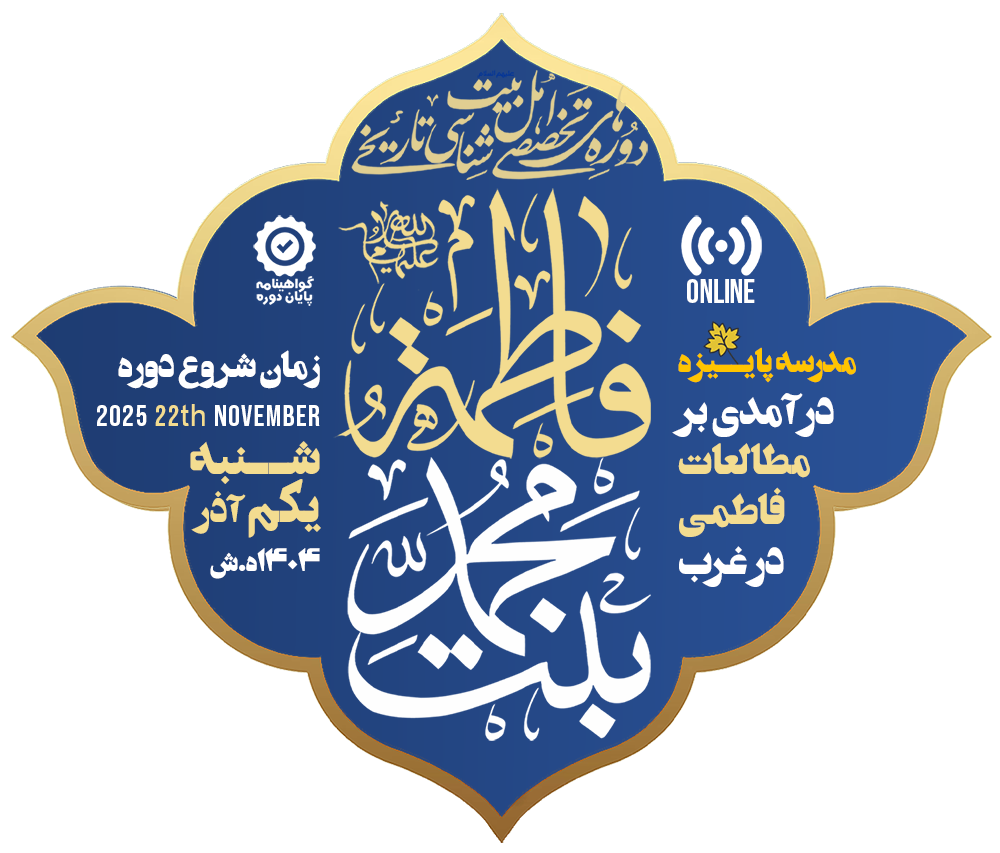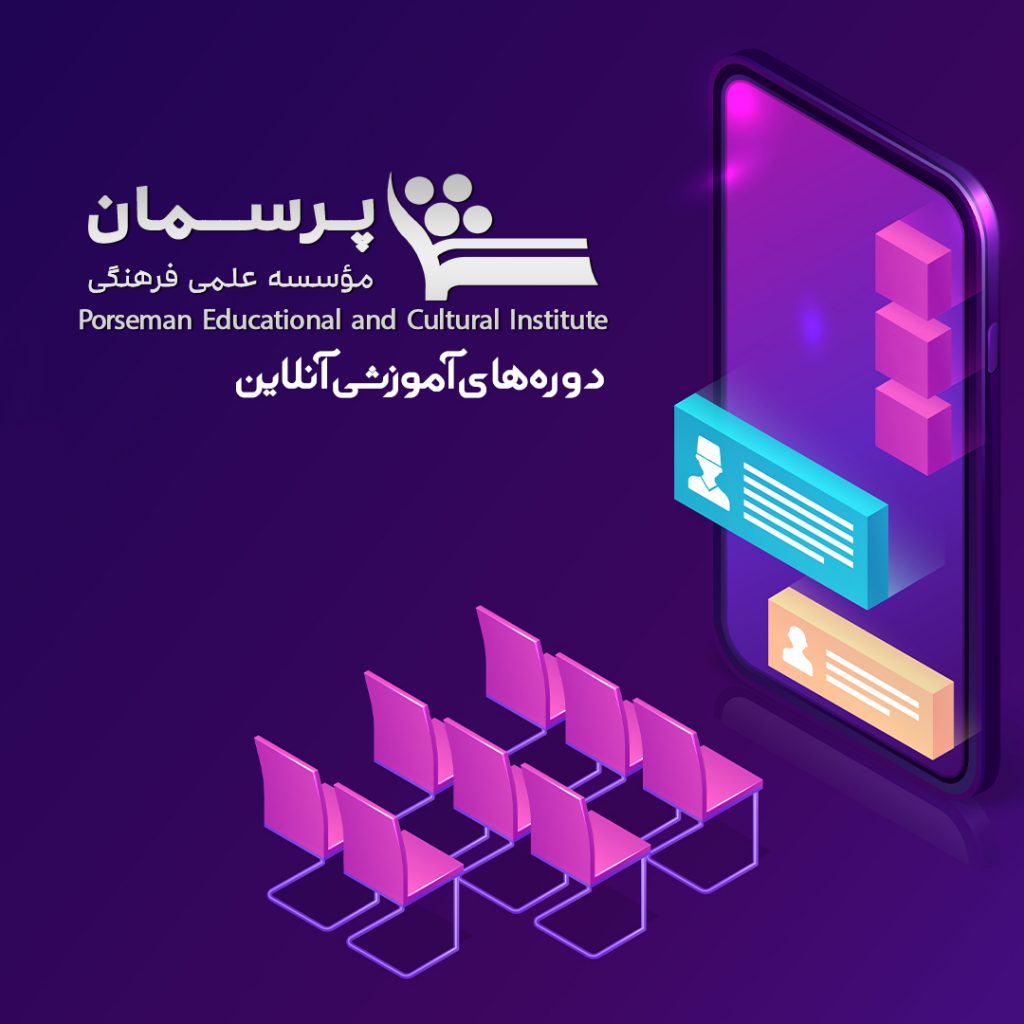
Number of topics: 17
Number of sessions: 37 sessions
Number of professors: 14 professors
Course level: Advanced university
Start date: Saturday, November 22
Course price: Free
Certification
Certificate of participation in the course
Audio and video file
lessons in audio or video format
Online and telephone support
And on social networks
Free course
Why is this specialized course free?

This Autumn School adopts a rigorously academic approach to present a refined picture of the position of Lady Fatima al-Zahra (PBUH) in Western scholarship. It situates Fatima Studies within the historical and methodological development of Islamic and Shiʿi Studies in Western academia, offering a critical re-reading of encyclopaedia entries, monographs, articles, and comparative works.
Throughout the programme, participants will examine how Western epistemic, linguistic, and theological frameworks have shaped the image of Lady Fatima (PBUH)—from Orientalist narratives and encyclopaedia entries to comparative theology and literary representations. The course aims to equip participants with a robust scholarly framework for studying, comparing, and critically evaluating this field in a fair and historically informed manner.
Organised by the Porseman Academic–Cultural Institute, this four-week online Autumn School offers a structured introduction to the figure of Lady Fatima al-Zahra (PBUH) as she appears in Western academic research. Bringing together an international faculty from Iran, the United States, Canada, Germany, and Italy, the programme combines historical, textual, theological, and comparative approaches to what we call “Fatima Studies” within the broader field of Islamic/Shiʿi Studies in the West.
The Autumn School is designed for:
- Graduate and advanced undergraduate students in Islamic Studies, Religious Studies, Theology, History, Middle Eastern Studies, and related fields.
- Researchers, lecturers, and PhD candidates working on Shiʿi studies, gender in religion, comparative theology, or Christian–Muslim relations.
- Interested scholars, seminarians, and professionals seeking an academically grounded introduction to Fatima Studies in Western scholarship.
No prior specialization in Fatima Studies is required, but familiarity with basic concepts in Islamic and/or Religious Studies will be an advantage.
By the end of the course, participants will be able to:
- Explain the historical development and range of approaches in “Islamic/Shiʿi Studies in the West.”
- Identify the representation of Lady Fatima (PBUH) in key Western sources and compare these portrayals with Shiʿi and Sunni sources.
- Recognise dominant methods (historiography, textual criticism, linguistics, contextualism, etc.) and analyse the strengths and weaknesses of each approach.
- Critically evaluate key case studies, including entries in the Encyclopaedia of Islam, peer-reviewed articles, and theses/dissertations.
- Formulate precise research questions and design interdisciplinary pathways for future work in Fatima Studies and related subfields.
12 topics, delivered by 9 instructors, are taught in Persian, with English subtitles available.
5 topics, delivered by 5 instructors, are taught in English, with Persian subtitles available.
All organisational communication, schedules, and course materials will be provided in English, with Persian support where needed.
Number of sessions: 37 sessions of 30 minutes
Duration: Four consecutive weeks (Saturday to Wednesday),
19:00–20:15 (Tehran time)
Start date: Saturday, 1 Azar 1404 / 1 Jumada al-Thani 1447 / 22 November 2025
Format: Online, live sessions (each day two 30-minute sessions)
Platform: Skyroom (access via the participant’s online dashboard after registration)
The programme comprises 17 specialised lectures/modules, delivered in Persian or English (with subtitles):
Topic 1. Islamic Studies in the West: Background, Development, and Reasons for Its Pursuit
(1 session; Dr. Mohsen Alviri Khandan)
This opening lecture traces the formation and development of Orientalism from religious beginnings through political and academic phases. It addresses questions such as: Why and how did Islam become an object of study in the West? and How did Western views of Islam change across periods? A critical analysis of the three main stages of Orientalism, together with intra-Western critiques (including readings of Edward Said), provides the conceptual framework for the course.
Topic 2. We and the Current State of Islamic Studies in the West: A Case Study of Khalid Sindawi’s “Muṣḥaf Fāṭima (peace be upon her): Is It a Shiʿi Qur’an?”
(1 session; Dr. Mohsen Alviri Khandan)
Using Sindawi’s article as a case study, this session evaluates how the position of Lady Fatima (PBUH) in the Shiʿi tradition is represented. It examines source selection, methodology, and the possibility of hidden biases, and offers a critique of the article’s title, argumentative structure, and conclusion as a basis for further research trajectories in Fatima Studies.
Topic 3. The Chosenness of Fatima (peace be upon her): Proofs and Evidence
(1 session; Dr. Ali Rad)
This lecture examines the concept of “chosenness” in relation to the theology of election in the Abrahamic traditions and within Islamic thought. It provides a Qur’anic and hadith-based analysis of chosenness, relates it to questions of gender, and proposes a systematic framework for understanding the eminent position of Lady Fatima (PBUH).
Topic 4. Lady Fatima (peace be upon her): From Exemplar to Myth
(1 session; Dr. Ali Rad)
Critiquing one-dimensional approaches, this session differentiates between reliable historical narration and myth-making. It discusses the model of Lady Fatima (PBUH) as a “comprehensive and accessible exemplar” for Muslim women and explores its educational and social implications in contemporary contexts.
Topic 5. Manifestations of the Connection between Mahdism and Lady Fatima (peace be upon her) in Islamic Studies in the West
(1 session; Dr. Zohair Dehghani Arani)
Focusing on the relationship between Imam Mahdi (may God hasten his reappearance) and Lady Fatima (PBUH), this lecture examines relevant Islamic sources and Western readings. It discusses the place of this relationship in Imami theology, its potential for scholarly dialogue, and its implications for cross-tradition understanding.
Topic 6. The Position of Lady Fatima al-Zahra (peace be upon her) in the Fatimid State from the Perspective of Islamic Studies in the West
(2 sessions; Dr. Seyyed Naser Mousavi)
These sessions analyse the link between Fatimid political legitimacy and their claimed descent from Lady Fatima (PBUH), as reflected in official sources and Western studies. They explore the relative absence of her name in certain texts and critically assess the dominance of political readings over theological dimensions.
Topic 7. Methodology of Fatima Studies in the West
(3 sessions; Dr. Seyyed Hamed Alizadeh Mousavi)
This module examines the use of historiographical methods, textual criticism, and contextualism in readings of Fatima-related texts. It highlights strengths and limitations through concrete examples and reflects on the relationship between “fidelity to revelatory principles” and “academic methodological rigour,” proposing a critical strategy for engaging with Western scholarship.
Topic 8. The Image of Lady Fatima (peace be upon her) in the Three Editions of the Encyclopaedia of Islam (Leiden)
(4 sessions; Dr. Fatemeh Janahmadi)
Through a comparative analysis of the entry “Fatima bint Muhammad” across three editions of the Encyclopaedia of Islam, this topic traces shifts from historical-familial framing to anthropological perspectives. It critiques methods, referencing practices, and underlying epistemic frameworks, and argues for the need to develop alternative scholarly narratives by Muslim academics.
Topic 9. Lady Fatima (peace be upon her) in Islamic Studies in the West: A Reading of Verna Klem’s Article in EI3
(2 sessions; Dr. Saeed Tavousi Masroor)
Focusing on Verna Klem’s article in EI3, this topic examines its structure, sources, and epistemic approach. It assesses the reliance on Sunni narrations, the treatment of Imami sources, and the impact of secular assumptions in narrowing theological and walāya-related dimensions, and proposes a model for fair assessment of similar works.
Topic 10. The Question of Succession in Western Islamic Studies
(1 session; Dr. Saeed Tavousi Masroor)
This lecture analyses how Western Islamic Studies address the succession of the Prophet Muhammad (PBUH and his family)—a key issue for understanding the historical divergence between Sunnis and Shiʿa, and for locating Lady Fatima al-Zahra (PBUH) within Islamic theology. It revisits Orientalist interpretations of “caliphate” and “imamate” in light of classical sources and contemporary research, highlighting neglected theological dimensions.
Topic 11. Typology of Fatima Studies in Germany, with Emphasis on Non-Encyclopaedic Sources
(2 sessions; Dr. Gholam-Ahya Hosseini)
These sessions introduce the German tradition of Islamic Studies and its contribution to precise Shiʿi textual scholarship. They map key trends, figures, and projects, compare German approaches with other Western contexts, and trace how the image of Lady Fatima (PBUH) shifts from historical figure to cultural/theological symbol.
Topic 12. Fatima bint Muhammad (peace be upon her) in English Literature
(2 sessions; Dr. Mohammadreza Fakhr Rouhani)
Through close readings of selected English-language poetry and prose, this topic explores the representation of Lady Fatima (PBUH), from moral and familial virtues to theological and gendered dimensions. It proposes a framework for literary-spiritual critique and reflects on the potential of such texts to promote more accurate understandings.
Topic 13. Comparative Theology: Fatima (peace be upon her) in Shiʿi Islam and Mary (peace be upon her) in Catholic Christianity
(3 sessions; Dr. Christopher Paul Clohessy)
After a brief overview of Western perceptions of Islam, this module offers a theological comparison between the position of Lady Fatima (PBUH) in Imami thought and that of Mary (PBUH) in Catholic theology. It examines points of spiritual and historical convergence and difference, and reflects on the horizons of interfaith dialogue and the rapprochement of religious understandings.
Topic 14. Bärbel Köhler’s Habilitation Thesis: “Fatima bint Muhammad: The Transformation of a Female Figure in Early Islam”
(4 sessions; Dr. Seddiqeh-Sadat Mousavi Khansari)
These sessions introduce and critique the structure and chapters of Köhler’s study, focusing on constructive/mystical elements and their capacity to access theological depth. They also examine the role of the Buyid period and hagiographical literature in consolidating Lady Fatima’s (PBUH) position in Imami theology and discuss the potential for reconstructing an Islamic scholarly narrative from these materials.
Topic 15. “Chosen Among Women”: Mary and Fatima (peace be upon them both) in Medieval Christianity and Shiʿi Islam
(4 sessions; Dr. Mary F. Thurlkill)
………….
Topic 16. A Brief Survey of Western Academic Works on “Muṣḥaf Fāṭima (peace be upon her)”
(2 sessions; Dr. Farhad Ghoddousi)
……………….
Topic 17. Fatima (peace be upon her) as an Axis of Conflict and Suffering in Islamic Sources
(3 sessions; Dr. Vinay Khetia)
The final topic examines how Lady Fatima (PBUH) is portrayed at the intersection of conflict, injustice, and suffering in Islamic sources, and how these narratives are approached in contemporary scholarship.
The Autumn School is taught by 14 university-based and seminary-trained scholars from Iran, the United States, Canada, Germany, and Italy. Their expertise spans Islamic history, Shiʿi studies, Qur’anic studies, comparative theology, gender studies, and English-language Islamic literature. Selected profiles include:
Dr. Mohsen Alviri Khandan – Professor of History and Head of the History Department, Baqir al-ʿUlum University (Qom); specialist in Islamic historiography, the history of Shiʿism, and Islamic Studies in the West.
Dr. Ali Rad – Associate Professor, Farabi Campus, University of Tehran; specialist in Qur’anic sciences, Imami exegesis, and critiques of Orientalist scholarship on Shiʿism.
Dr. Zohair Dehghani Arani – Assistant Professor, University of Tehran; co-founder of the “Qur’an and Orientalists” association and a leading researcher on Mahdism.
Dr. Seyyed Naser Mousavi – Faculty member in Islamic History, University of Religions and Denominations; researcher of the Fatimid dynasty, religious rituals, and religious institutions.
Dr. Seyyed Hamed Alizadeh Mousavi – Research Institute for Islamic Culture and Thought; comparative theology, Qur’anic studies, and methodological critiques of Orientalism.
Dr. Fatemeh Janahmadi – Faculty member, Tarbiat Modares University; specialist in Fatimid and Ismaʿili studies with extensive publications.
Dr. Saeed Tavousi Masroor – Assistant Professor, Allameh Tabataba’i University; works on Islamic history and Western Shiʿi Studies.
Dr. Gholam-Ahya Hosseini – Researcher and PhD student (Göttingen/Erlangen); focuses on Shiʿi Studies in Germany and the English-speaking world.
Dr. Mohammadreza Fakhr Rouhani – Professor of Linguistics, University of Qom; researcher in English-language Islamic literature and devotional poetry.
Dr. Seddiqeh-Sadat Mousavi Khansari – University of Tübingen; researcher in Islamic philosophy and Shiʿi thought.
Dr. Mary F. Thurlkill – Professor of Religious Studies, University of Mississippi; specialist in comparative religion, Islamic Studies, and gender.
Dr. Vinay Khetia – Academic Director, Institute of Shiʿi Studies, Toronto School of Theology; specialist in Islamic law, Qur’anic exegesis, and Twelver Shiʿi theology.
Dr. Farhad Ghoddousi – Wayne State University; active in Islamic Studies, Qur’anic Studies, and Shiʿi Studies.
Dr. Christopher Paul Clohessy – Senior Lecturer at PISAI (Rome); Catholic priest and leading scholar of Fatima Studies, Karbala, and Christian–Muslim dialogue.
An optional self-assessment test (multiple-choice questions based on session content) will be offered.
Non-participation in the test does not prevent receiving a certificate, provided other participation criteria are met.
An electronic certificate of completion will be issued to participants who attend at least 80% of the sessions.
The fee for issuing the certificate will be announced in due course; after payment, the certificate will be uploaded to the participant’s dashboard.
An English-language version of the certificate is available for international participants.
Admission criteria
The only formal requirement for registration is an ethical commitment to regular participation. The Autumn School is designed primarily for MA and PhD-level participants (and advanced undergraduates), but participation is open to all interested applicants, with no age, professional, national, religious, or gender restrictions.
Registration
Registration is conducted online through the Porseman website:
Create or log into your personal account on the Porseman website.
Navigate to the page “Fatima (PBUH) bint Muhammad: An Introduction to Fatima Studies in the West.”
Select “Register in the course” and complete the online registration form.
After confirmation, you will gain access to your dashboard, from which you can enter the virtual classroom via the “Online Courses” section.
Participation
All live sessions will be accessed through the participant’s dashboard on the Skyroom platform. Registered participants will receive further technical information and direct class links by email.
For academic and administrative queries regarding the Autumn School, registration, or technical access, please contact:
Coordinator (English): Truth_Seaker1
Coordinator (Persian): +98 933 491 4141
Institute email: porseman.ac.cu@gmail.com
Participants are warmly invited to share feedback and suggestions to help improve future editions of the Autumn School.

Holding specialized courses on historical Ahlul Bayt studies, in addition to the cost of time and manpower, involves significant financial costs for the institute. Given the institute’s lack of dependence on individuals and governmental or non-governmental institutions on the one hand, and the heavy costs of holding these courses and our poverty on the other, we need your cooperation and financial participation to continue the “Ahlul Bayt Studies” project and improve its comprehensive quality. Those who wish to participate can pay their desired amounts through the option above or deposit/transfer them through the following methods and send the receipt to the course sponsor.
Card number: 5022291079400121


